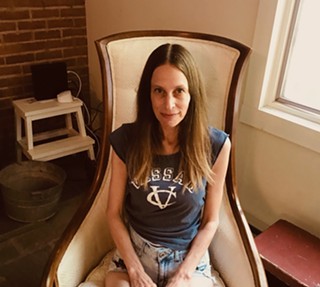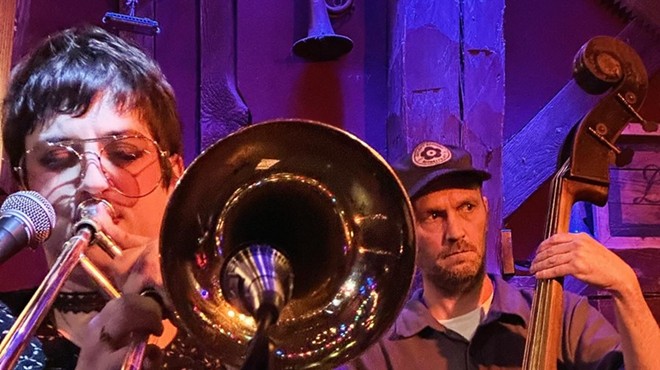A globetrotting MD on a mission to crush cervical cancer. An acupuncturist who’s moving the needle on access to holistic care. A spiritual intuitive with training in emergency mental health. I recently sat down with these powerhouse healers to talk about their work in the world, the passions and principles that drive them, and their advice to you, dear readers.
Maggie Carpenter, MD
International healthcare crusader
Work in the world: From spearheading women’s health initiatives in Ethiopia, to leading palliative and hospice care programs here at home, Maggie Carpenter gets around. About six years ago, I wrote about her nongovernmental medical nonprofit Go Doc Go, which she created to help bring cervical cancer screenings to parts of sub-Saharan Africa—where Pap smears didn’t exist and about 53,000 women died yearly of the preventable cancer caused by the human papillomavirus virus (HPV). Since then, the New Paltz-based doctor and her team of volunteers have brought HPV testing (simpler than the Pap but no less effective) and treatment protocols to Senegal, the Gambia, and Haiti. Next stop: Alabama, where Carpenter hopes to bring HPV testing to US communities with “a super-high rate of cervical cancer and very low access to women’s health care.”
“About three years ago, the World Health Organization said cervical cancer was a crisis and stressed the need for increasing screening around the world,” says Carpenter, whose volunteer work is supported by tax-deductible fundraising. “That has made a big difference in how the countries receive us and their interest in having our services.” These days, she’s able to get more done thanks to the help of Go Doc Go’s program director, Patricia Bacon. This frees up Carpenter to focus on tending to her local palliative and hospice care patients, as well as those in need of medical marijuana certification, through her Nightingale Medical practice.
Biggest passions: Volunteering to improve lives has always motivated Carpenter in her work—and lately she’s channeling those efforts to support people’s self-determination. “In my 20-plus years as a physician, I’ve heard way too many stories of people who feel stuck and unable to advocate for themselves or make the changes they would like to see,” she says. “To empower people to be their true selves and live life to their fullest is my goal. Sometimes it just takes listening and seeing them for who they are. Often it takes connecting them with the tools they need.”
On being a change-maker: Carpenter has hit many roadblocks, from bureaucracy to stubborn mindsets. To make change, she has to get creative and find alternative solutions. One case in point is The Box, an interactive art installation created in collaboration with Hudson Valley artist Ryan Cronin. A fixture at Kingston’s O+ Festival in 2017 and 2018, The Box is a free, portable, private space where women can self-test for HPV. “A lot of people don’t know these tests can be self-collected,” says Carpenter. “Education and engagement are extremely important. You need communities that understand the problems and are engaged in making the change.”
Bit of advice: “Listen to your heart. Don’t be ruled by fear and concerns about what others may think,” says Carpenter. She has proved many naysayers wrong with her endeavors, including her early espousal of medical marijuana. “If you’re doing the right thing, you will never regret it.”
Masha Schmidt
Acupuncturist and community clinic owner
Work in the world: The realm of wellness has always exerted a pull for Masha Schmidt, who immigrated to the US from Odessa, Ukraine, as a baby with her family in 1978. Following a brief stint post-college in employee wellness, she left the corporate world after 9/11 to study yoga, then acupuncture. At every turn, she found a lack of inclusivity and financial accessibility—from the whitewashed demographics (“there were almost no Asians in my [acupuncture] school”) to the cost of entry ($60K for a three-year master’s program) to the price of treatments, which is out of reach for many. Asks Schmidt, “Why is wellness the least accessible to the people who need it most?”
Determined to change that, she set out to find a new model—eventually opening the DayDream Collaborative Clinic in Beacon in 2021. (A previous iteration, the Hudson Wellness Clinic, served the Hudson community.) The multidisciplinary, trauma-informed clinic offers treatments on a sliding scale under a simple premise: As long as some people are able to pay at the top of the scale, those funds will help to subsidize those who can’t pay as much. With about a half-dozen practitioners, DayDream offers community acupuncture clinics that are combined with one other modality—such as acupressure, Reiki, craniosacral therapy, or sound healing. The space has group events too, including a Birth Story Hour that starts on October 6. “Our goal,” says Schmidt, “is to never turn anyone away for lack of funds.”
Biggest passions: Indigenous traditions have a lot of juice for her. “I grew up in a community of immigrants, so ‘folk traditions’ like fire cupping (my grandpa brought over his cups from Odessa), mustard plasters, or herbal teas were part of our day-to-day lives,” Schmidt recalls. “I got some funny looks in high school gym class coming in with cupping marks all over my back.” She went from rejecting these traditions as a teenager to re-embracing them in grad school, when her teachers affirmed their efficacy. “The modern allopathic medical system is a relatively new set of ideas and definitely could benefit from asking Grandma for advice.”
On being a change-maker: “My approach is curiosity and a willingness to question the entire concept of ‘wellness’—who defines it, who has access to care, and who has the opportunity to become a practitioner,” says Schmidt. “It’s also important to recognize the staggering role that stress, trauma, and nervous system dysregulation play in our experience of health. Nervous system support is the best medicine, but healthy nervous systems depend on external conditions. We all need access to safe, affordable, and stable housing, food, water, medical care, support systems, childcare, eldercare. ‘Holistic’ care is not a substitute for these things, but a way to improve our quality of life regardless of where we’re starting from.”
Bit of advice: Consider coming together in groups to heal—and challenge the idea that health and wellness are private, individual affairs. “We’re only as healthy as the most vulnerable people in our communities,” she says. “COVID made this clear. As we suffer the effects of late-stage capitalism, climate change, pandemics, and natural disasters, we will need more places where people can come together to heal, to learn, and to remember hope and connection.”
Taylor Jackson
Intuitive reader and Reiki practitioner
Work in the world: Though she’s trained in the arts of astrology, tarot, and Reiki, the last thing Taylor Jackson wants her clients to do is feel the need to consult her before they make any move or decision in life. She’d rather empower them to find their own inner guide. “My approach is centered on the wholeness of the person, really witnessing them, seeing them, providing all the insight that I get from divine communication in ways that are going to help them become the most themselves,” says Jackson, who also goes by Black Satin Venus. “My goal is for people to tap into their own sense of intuition and confidence.”
What’s singular about Jackson’s approach is that she blends her ethereal modalities with a firm focus on mental health—she’s trained in emergency Mental Health First Aid as well as QPR (Question, Persuade, Refer) Suicide Prevention. “What I was seeing, especially during lockdown, was that people were just not okay,” she explains. “I’ve been recommending these trainings to every wellness reader or spiritual practitioner that I can evangelize them to, because it wasn’t very long after I completed the mental health training that I had my first client express a desire to end their life. We turned off the timer, I moved the cards to the side, and my body language shifted as I asked the questions and worked the conversation as I’d been trained to do.” Jackson, who is based in Beacon and gives readings on Zoom and at events, collaborates with local therapist Moraya Seeger DeGeare to help clients with self-discovery. She also offers Reiki during community acupuncture sessions at DayDream Collaborative Clinic.
Biggest passions: After doing astrology readings as a side gig for years, Jackson quit her career in corporate marketing when the pandemic hit, pivoting toward a path that better suited her—and that better served others. “A lot of times as I’m speaking with people, it’s just clearing out external noise and old programming to validate what they already deeply feel inside,” she says. “Whether it comes through mediumship or their higher self or spirit guides, I try to give clarity, insight, and a breath of fresh air to anyone who works with me.”
On being a change-maker: Creating change is a kind of alchemy for Jackson, one that brings out “the harmony I see between science, traditional mental health, and spiritual and wellness support,” she says. “That is something I’m so excited to be part of—the movement where all of these are playing well together to offer a well-rounded experience of lifting people up.”
Bit of advice: “Surround yourself with people, whether it’s your friends or healing practitioners, who see the wholeness and fullness of you,” says Jackson. “A huge part of my approach is that every person’s self-actualization is a vital part of the world we all create. It’s about realizing your gift and core contribution to this collective. Be around people who empower you to be the most radiantly you.”














